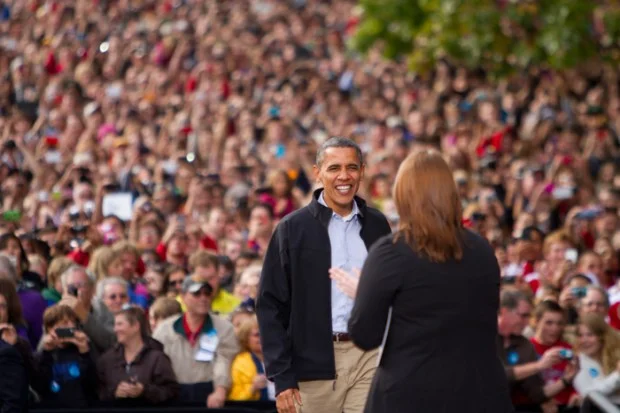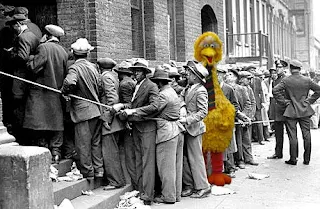And the crowds were there for him. 12,000 in Denver, and 30,000 in Madison, Wisconsin. Preliminary fundraising numbers suggest that the Obama campaign brought in more than $150 million in September, a record for this campaign by anyone. Update: The final figures for Sept. indicate $181 million. Also in September, the Obama campaign passed 10 million total donors in 2012.
The news cycles since Wednesday changed topics rapidly. At first the Romney debate win. Then pretty quickly, the Romney lies. He lied about his tax plan. He lied about the number of green companies that got federal support and went under (he said half. It's less than 1%.) He lied about how wonderfully bipartisan he was as gov of MA. Above all he lied about what his own healthcare plan provides. It does not in any way stop insurance companies from denying coverage for preexisting conditions. Paul Krugman called it a sick joke.
But what seems to be lasting from the debate was a single line by Romney that he probably meant as a sop to conservatives (who were otherwise getting shafted by his apparent etch-a-sketch position changes) and a mild attempt to show himself as a tough administrator: he vowed to not only end Obamacare, but to shut down PBS. He specifically mentioned Big Bird.
The debate got a huge audience and a record number of tweets--more on Big Bird than any other moment. And that's what has lasted. Not only in the outrage of people like LeVar Burton that Romney would target programs that help children learn to read for a miniscule savings in the federal budget, or even by frightening children themselves, but by providing President Obama with a very effective campaign riff. Romney refuses to reign in Wall Street, he said, but he wants to destroy Sesame Street.
Then came the big news of the September jobs report on Friday. It would be big news only if it were very bad or very good. It was very good. The unemployment rate went from 8.1 to 7.8, which is the big headline. But the report also shows that the economy was growing faster during the summer than previous reports suggested, as new jobs totals for the previous two months were revised sharply upward.
This good news for the American economy was greeted by Republicans with denial, and with suggestions that the Obama administration had fixed the numbers--precisely the most damaging response they could make, because it showed that they found an improving American economy disappointing--they would rather than more people unemployed.
But then this is fairly typical of how GOPers blow their victories with arrogance. Their response the day after the debate was not to praise Romney but to deride the President in obviously racist terms. Romney campaign co-chair Sununu said it showed that Obama is "lazy" among other slurs.
Meanwhile, in his effort to turn his aggressive debate perform into working class votes, Mitt Romney spoke again in coal country, on the day that more came out about his coal company appearance in August--not only were miners forced to attend his speech during their shift but without pay, they are coerced into contributing to Romney's campaign. This story might not make waves in the national press, but I can guarantee that every worker in Virginia, Ohio, Pennsylvania, etc. who hears about it won't like it one bit.
Speaking of Ohio, another victory there against voter suppression: a federal court required that Ohio restore its final weekend early voting for all its citizens. The Ohio GOPer state government responded as PA's has done, by dragging its feet in implementation. But the fact remains that the courts have restored all the voting rights in Ohio the GOPers tried to take away.
As for the permanent damage of the first debate, the jury is out and will be for at least a week. The first polls that take the debate into consideration don't show much if any damage to Obama, though Romney may have gotten a boost. Ordinarily, the first polls out next week would say more. But now with the jobs report changing the narrative already, it's not clear how long Romney's gains, if any, would hold. But if next week's polls show President Obama maintaining a clear lead, it probably shows what many professionals suggested even before the debate: they don't move the numbers all that much.




















